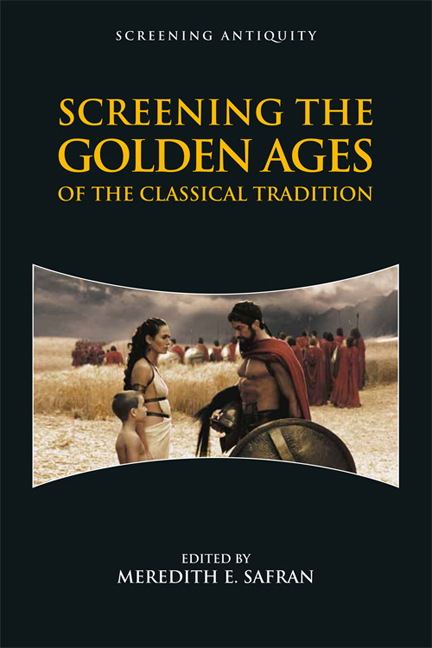Book contents
- Frontmatter
- Contents
- Series Editors’ Preface
- Editor's Acknowledgments
- Contributors
- Illustrations
- Abbreviations
- Introduction: Searching for Gold in an Age of Iron
- PART I THE GLORY THAT WAS GREECE
- PART II THE GRANDEUR THAT WAS ROME
- 8 “All That Glitters …”: Problematizing Golden-Age Narratives in Vergil's Aeneid and the Western Film Genre
- 9 The Golden Age and Imperial Dominance in the Aeneid and Serenity (2005)
- 10 Turning Gold into Lead: Sexual Pathology and the De-mythologizing of Augustus in HBO's Rome (2005–2007)
- 11 The Dux Femina Ends Westeros’ Golden Age: Cersei Lannister as Agrippina the Younger in HBO's Game of Thrones (2011–)
- 12 The Golden Aspects of Roman Imperialism in Film, 1914–2015
- 13 Broken Eagles: The Iron Age of Imperial Roman Warfare in Post-9/11 Film
- 14 Dreaming of Rome with Ridley Scott's Gladiator (2000)
- Filmography
- Bibliography
- Index
14 - Dreaming of Rome with Ridley Scott's Gladiator (2000)
from PART II - THE GRANDEUR THAT WAS ROME
Published online by Cambridge University Press: 23 November 2019
- Frontmatter
- Contents
- Series Editors’ Preface
- Editor's Acknowledgments
- Contributors
- Illustrations
- Abbreviations
- Introduction: Searching for Gold in an Age of Iron
- PART I THE GLORY THAT WAS GREECE
- PART II THE GRANDEUR THAT WAS ROME
- 8 “All That Glitters …”: Problematizing Golden-Age Narratives in Vergil's Aeneid and the Western Film Genre
- 9 The Golden Age and Imperial Dominance in the Aeneid and Serenity (2005)
- 10 Turning Gold into Lead: Sexual Pathology and the De-mythologizing of Augustus in HBO's Rome (2005–2007)
- 11 The Dux Femina Ends Westeros’ Golden Age: Cersei Lannister as Agrippina the Younger in HBO's Game of Thrones (2011–)
- 12 The Golden Aspects of Roman Imperialism in Film, 1914–2015
- 13 Broken Eagles: The Iron Age of Imperial Roman Warfare in Post-9/11 Film
- 14 Dreaming of Rome with Ridley Scott's Gladiator (2000)
- Filmography
- Bibliography
- Index
Summary
“There was once a dream that was Rome. You could only whisper it; anything more than a whisper and it would vanish, it was so fragile. And I fear it will not survive the winter.” With these words from the opening act of Gladiator (2000), the aging emperor Marcus Aurelius (Richard Harris) confides in his general Maximus (Russell Crowe) that he wishes to make imperial Rome a republic once more, and for Maximus to be the agent of this transition. Gladiator's central revenge-plot finds both its beginning and its resolution in this dream of the Republic: it is to prevent this transition and secure his imperial inheritance that Commodus (Joaquin Phoenix) murders Aurelius and orders the deaths of Maximus and his family. As Maximus struggles to return to Rome, exact his revenge, and depose Commodus, the political question of republic versus empire is linked inextricably to the progression of both the film's hero and its narrative: Maximus’ last words at its climax, delivered over the corpse of his rival, promise the fulfillment of Aurelius’ nostalgic desire.
What does it mean to champion Rome's republic in the context of a Hollywood epic at the turn of the twenty-first century? Film critics, Classicists, and postcolonial theorists have regarded the film's ordering of its world through a discourse of republic as part of “a broader tradition in which [America] returns to Rome in order to speak its own history.” Whether Gladiator's Rome allegorizes an America “corrupt at its heart, based on enslavement, dedicated to sustaining pointless wars,” portrays a “conflict between two competing visions of what kind of superpower Rome, or by analogy America, should be,” or is “a film that is both about empire and of it – depicting Roman imperial rule while enacting US global cultural capitalism,” critics agree that the Republic serves as a point of reflection or refraction for contemporary perspectives on America, based upon a strong identification between America's democratic republic and the historical example of Rome.
This chapter further examines Gladiator's figuration of the Roman Republic, to show how it articulates a surprisingly ambivalent perspective on the enterprise of speaking America through Rome.
- Type
- Chapter
- Information
- Screening the Golden Ages of the Classical Tradition , pp. 259 - 276Publisher: Edinburgh University PressPrint publication year: 2018



